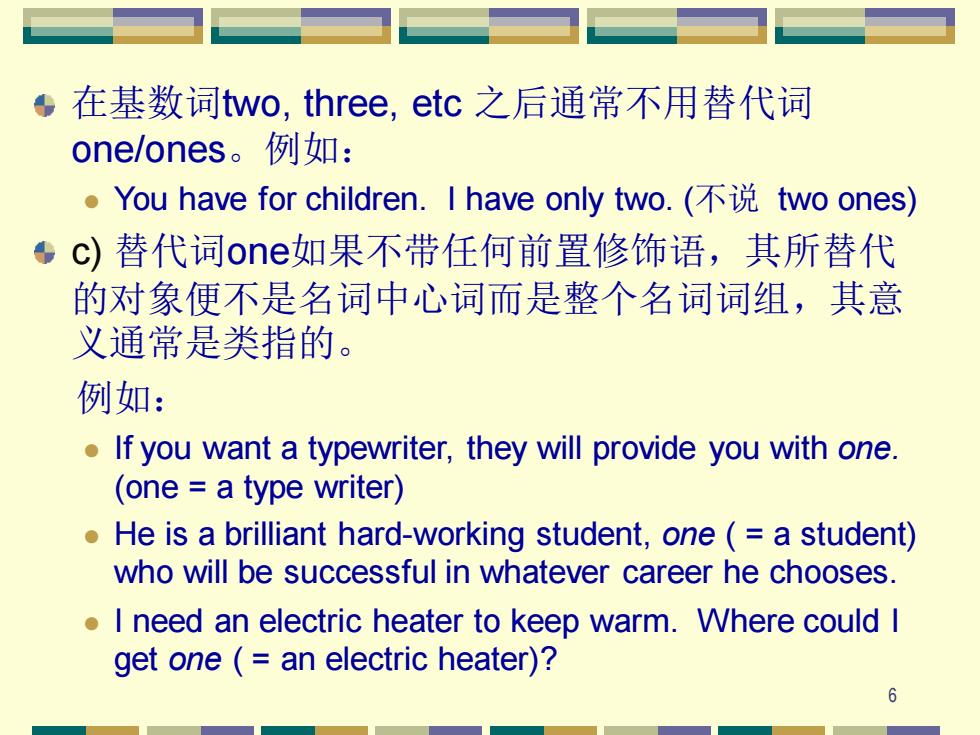
在基数词two,three,etc之后通常不用替代词 one/ones。例如: ●You have for children.I have only two..(不说two ones) c)替代词one如果不带任何前置修饰语,其所替代 的对象便不是名词中心词而是整个名词词组,其意 义通常是类指的。 例如: If you want a typewriter,they will provide you with one. (one a type writer) He is a brilliant hard-working student,one (a student) who will be successful in whatever career he chooses. I need an electric heater to keep warm.Where could I get one (an electric heater)?
6 在基数词two, three, etc 之后通常不用替代词 one/ones。例如: ⚫ You have for children. I have only two. (不说 two ones) c) 替代词one如果不带任何前置修饰语,其所替代 的对象便不是名词中心词而是整个名词词组,其意 义通常是类指的。 例如: ⚫ If you want a typewriter, they will provide you with one. (one = a type writer) ⚫ He is a brilliant hard-working student, one ( = a student) who will be successful in whatever career he chooses. ⚫ I need an electric heater to keep warm. Where could I get one ( = an electric heater)?
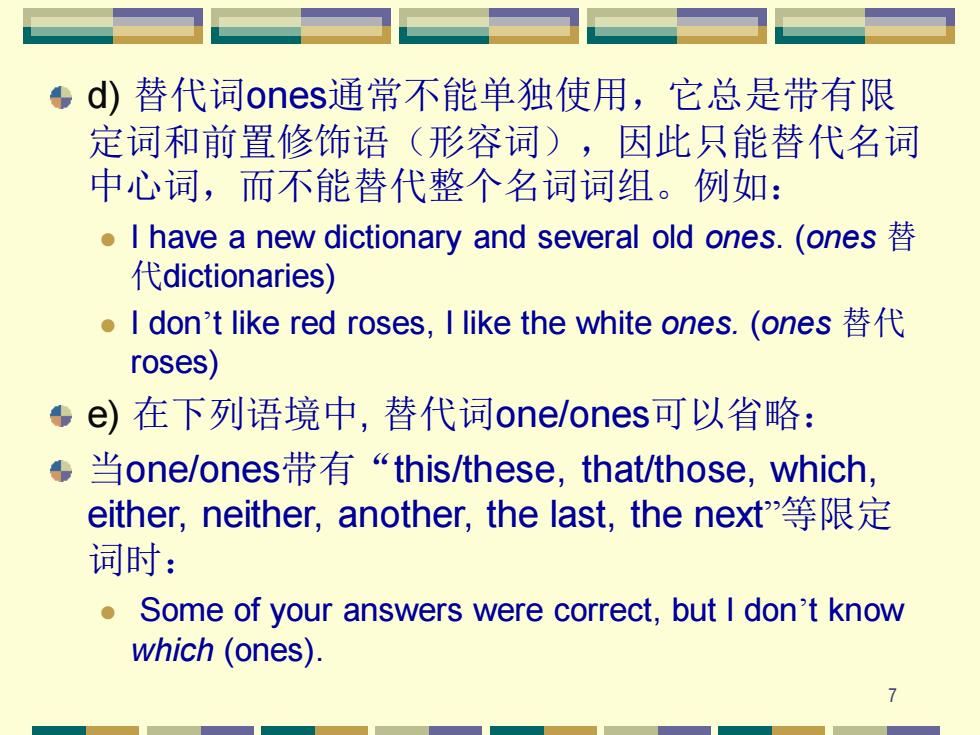
d)替代词ones通常不能单独使用,它总是带有限 定词和前置修饰语(形容词),因此只能替代名词 中心词,而不能替代整个名词词组。例如: I have a new dictionary and several old ones.(ones 代dictionaries) ●Idon't like red roses,I like the white ones.(ones替代 roses) e)在下列语境中,替代词one/ones可以省略: s当one/ones带有“this/these,that/those,which, either,.neither,.another,the last,the next等限定 词时: Some of your answers were correct,but I don't know which (ones)
7 d) 替代词ones通常不能单独使用,它总是带有限 定词和前置修饰语(形容词),因此只能替代名词 中心词,而不能替代整个名词词组。例如: ⚫ I have a new dictionary and several old ones. (ones 替 代dictionaries) ⚫ I don’t like red roses, I like the white ones. (ones 替代 roses) e) 在下列语境中, 替代词one/ones可以省略: 当one/ones带有“this/these, that/those, which, either, neither, another, the last, the next”等限定 词时: ⚫ Some of your answers were correct, but I don’t know which (ones)
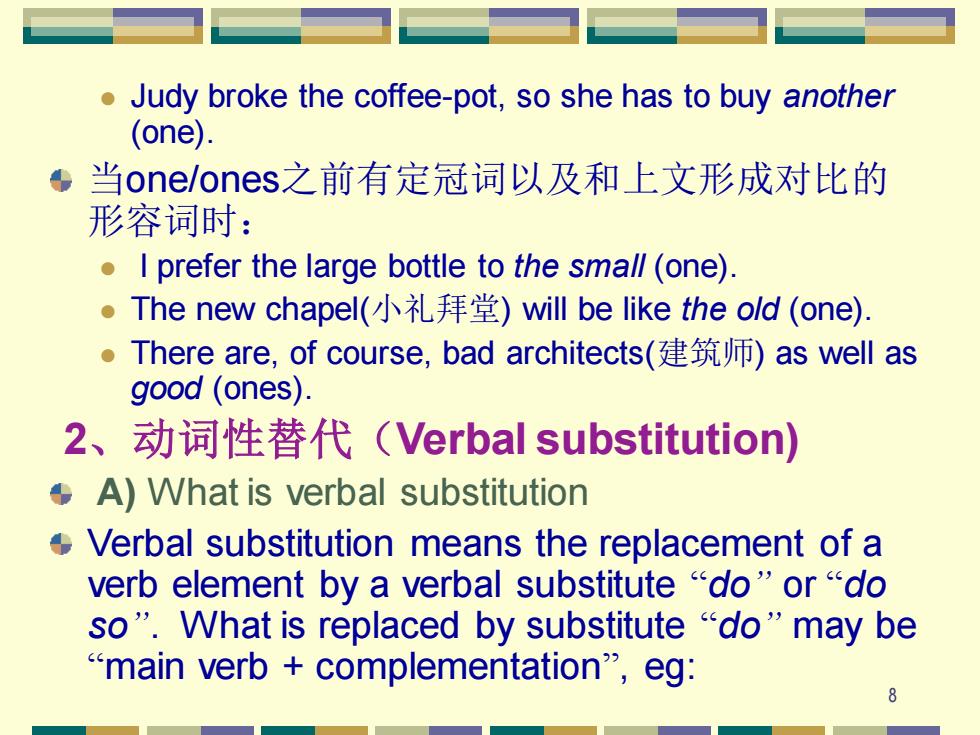
Judy broke the coffee-pot,so she has to buy another (one). 当one/ones之前有定冠词以及和上文形成对比的 形容词时: I prefer the large bottle to the small(one). ●The new chapel(小礼拜堂)will be like the old(one). ·There are,of course,bad architects(建筑师)as well as good (ones). 2、动词性替代(Verbal substitution) A)What is verbal substitution Verbal substitution means the replacement of a verb element by a verbal substitute“do'or“do so'”.Vhat is replaced by substitute“do'”may be “main verb+complementation”,eg:
8 ⚫ Judy broke the coffee-pot, so she has to buy another (one). 当one/ones之前有定冠词以及和上文形成对比的 形容词时: ⚫ I prefer the large bottle to the small (one). ⚫ The new chapel(小礼拜堂) will be like the old (one). ⚫ There are, of course, bad architects(建筑师) as well as good (ones). 2、动词性替代(Verbal substitution) A) What is verbal substitution Verbal substitution means the replacement of a verb element by a verbal substitute “do” or “do so”. What is replaced by substitute “do” may be “main verb + complementation”, eg:
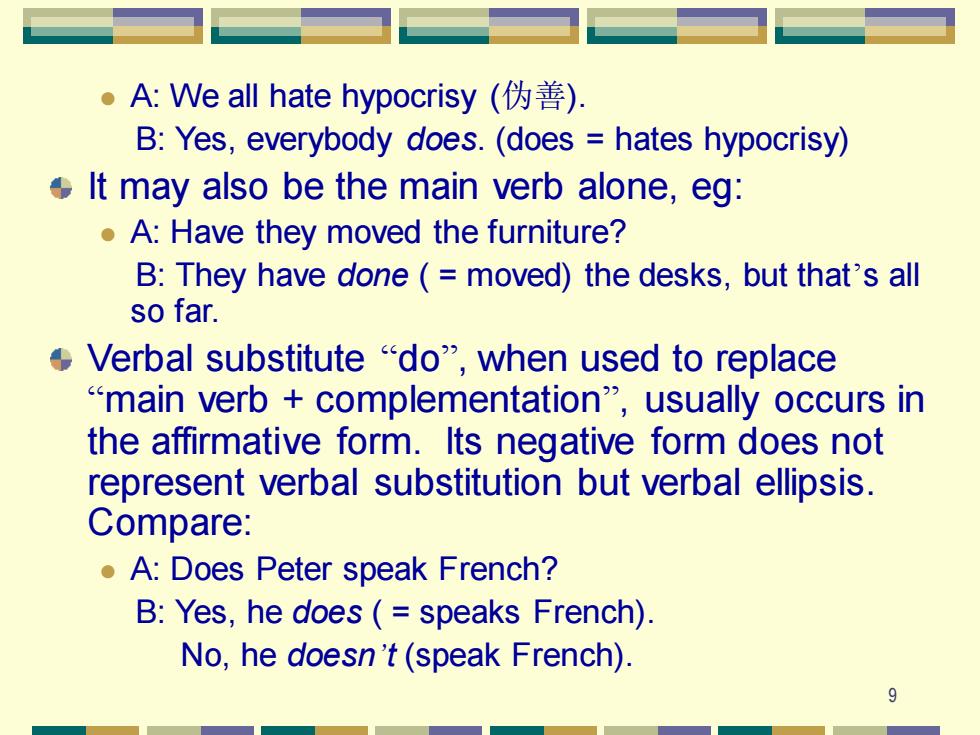
。A:Ve all hate hypocrisy(伪善). B:Yes,everybody does.(does hates hypocrisy) It may also be the main verb alone,eg: A:Have they moved the furniture? B:They have done (moved)the desks,but that's all so far. Verbal substitute“do”,when used to replace "main verb complementation",usually occurs in the affirmative form.Its negative form does not represent verbal substitution but verbal ellipsis. Compare: .A:Does Peter speak French? B:Yes,he does(=speaks French) No,he doesn't (speak French). 9
9 ⚫ A: We all hate hypocrisy (伪善). B: Yes, everybody does. (does = hates hypocrisy) It may also be the main verb alone, eg: ⚫ A: Have they moved the furniture? B: They have done ( = moved) the desks, but that’s all so far. Verbal substitute “do”, when used to replace “main verb + complementation”, usually occurs in the affirmative form. Its negative form does not represent verbal substitution but verbal ellipsis. Compare: ⚫ A: Does Peter speak French? B: Yes, he does ( = speaks French). No, he doesn’t (speak French)
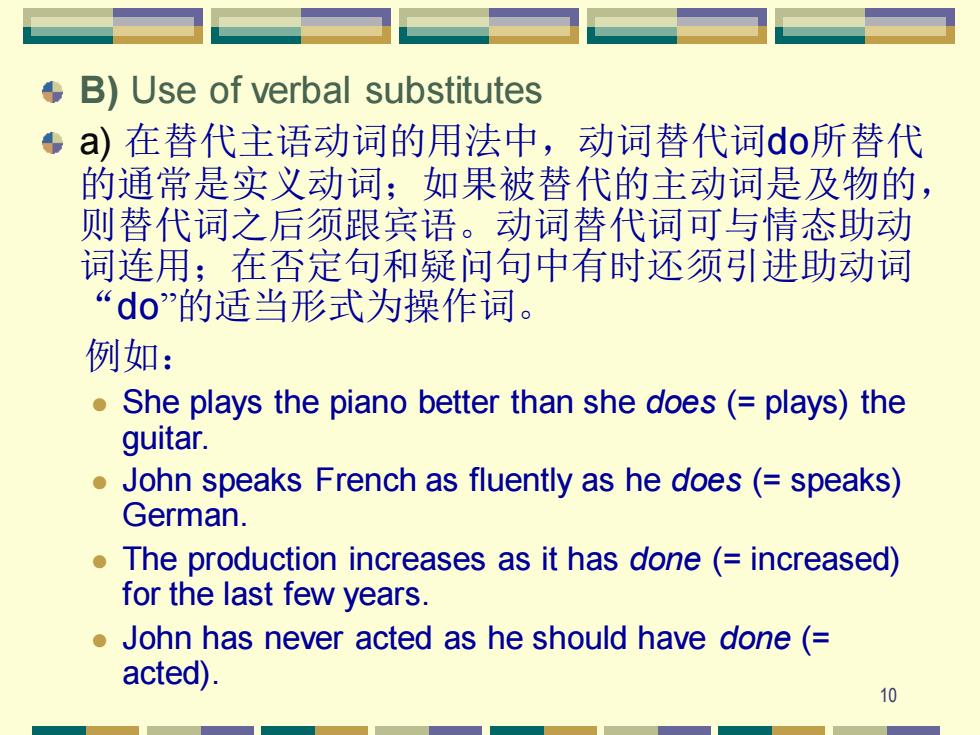
B)Use of verbal substitutes a)在替代主语动词的用法中,动词替代词do所替代 的通常是实义动词;如果被替代的主动词是及物的, 则替代词之后须跟宾语。动词替代词可与情态助动 词连用;在否定句和疑问句中有时还须引进助动词 “do的适当形式为操作词。 例如: She plays the piano better than she does(=plays)the guitar. John speaks French as fluently as he does (speaks) German. The production increases as it has done (increased) for the last few years. ●John has never acted as he should have done(∈ acted). 10
10 B) Use of verbal substitutes a) 在替代主语动词的用法中,动词替代词do所替代 的通常是实义动词;如果被替代的主动词是及物的, 则替代词之后须跟宾语。动词替代词可与情态助动 词连用;在否定句和疑问句中有时还须引进助动词 “do”的适当形式为操作词。 例如: ⚫ She plays the piano better than she does (= plays) the guitar. ⚫ John speaks French as fluently as he does (= speaks) German. ⚫ The production increases as it has done (= increased) for the last few years. ⚫ John has never acted as he should have done (= acted)